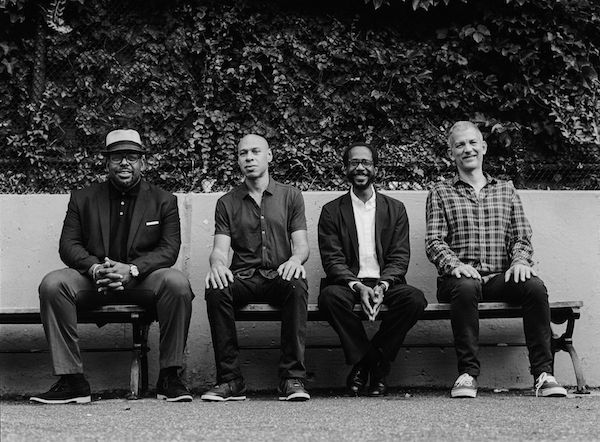Jan 13, 2026 2:09 PM
More Trump-Kennedy Center Cancellations
The fallout from the renaming of the John F. Kennedy Center for the Performing Arts to include President Donald…

Bassist Christian McBride (left), saxophonist Joshua Redman, drummer Brian Blade and pianist Brad Mehldau reconvened in the studio after more than two decades for RoundAgain.
(Photo: Michael Wilson)COVID-19 brought the entire world to a halt, but it’s not hyperbole to say jazz players have been uniquely affected by the situation we’re all living in now.
“I feel like I’ve been waiting 25 years for this,” said Redman, sequestered at his Berkeley home while speaking over FaceTime.
He’s disappointed about the scrapped tour and finds it difficult to not play music with friends, in general.
“The social-distancing thing, that’s not hard for me; I’m an antisocial motherfucker,” Redman said, laughing. “I mean, I’m not antisocial, but by nature I’m an introvert. Music is my social life—having that opportunity for real connection and communion with other human beings. ... [F]or me, music is that as much as it is anything.”
The connection and communion Redman spoke of was evident in the quartet from the start, according to Blade: “I do recall there was a great kinship and a sort of unspoken understanding of how to give the music—and each other and the wholeness of the group—what it needed for the music to continue to rise and lift people’s spirits, and simultaneously ours as well.”
Underscoring the sublime performances on MoodSwing was a level of expressiveness and openness to musical possibilities that would cross the jazz Rubicon, foreshadowing the universal acceptance of each player by their peers and the general public. The way they played together was in stark contrast to the music that jazz critics—according to Redman’s liner notes from the 1994 disc—would denigrate as “an elite art form, reserved for a select group of sophisticated (and rather eccentric) intelligentsia.”
Today, Redman is quick to point out that he wasn’t implying that jazz actually had become as haughty as some had suggested, and the music on MoodSwing speaks eloquently to that very point. But had the four of them back then discussed how they wanted their music to sound or how their album could be seen as a kind of pushback against those writers?
“I’m saying that not only were we not having long discussions,” said Redman, incredulously, “we have never had any discussion. I can definitely say that we have never, ever, the four of us, said one word about that. We don’t give a shit about that. We care about making music together. And if we’re true to that, then the rest, I hope, will take care of itself.”
Unspoken as it was, the body of work Redman, Blade, Mehldau and McBride have each amassed since that time seems to adhere to a precept combining their formidable musical acumen with an ability to play to the emotional heart of the matter, resulting in a resonance beyond boundaries. And their individual careers have taken each outside the genre: Redman’s forays into electronic funk; Mehldau with his solo and trio treatments of The Beatles, Radiohead and Soundgarden; McBride in his work with Sting, D’Angelo and Kathleen Battle; and Blade sitting behind the drums for artists like Joni Mitchell, Bob Dylan and Seal.
Blade sees the quartet’s multifaceted experiences as part of their collective identity in jazz, something one can hear on RoundAgain. “One thing does not negate another, especially in the music. When we make records, we want to make something enduring, regardless of what it might be labeled,” he said.
It’s a revelation to hear these same four incandescent minds, now filtered through a quarter-century of experience and wisdom, sounding like the band they once were, yet different—somehow even better. Listening to the new album and the group’s first effort back-to-back is like getting into a DeLorean time machine; things are at once eerily familiar and refreshingly new.

Belá Fleck during an interview with Fredrika Whitfield on CNN.
Jan 13, 2026 2:09 PM
The fallout from the renaming of the John F. Kennedy Center for the Performing Arts to include President Donald…

Peplowski first came to prominence in legacy swing bands, including the final iteration of the Benny Goodman Orchestra, before beginning a solo career in the late 1980s.
Feb 3, 2026 12:10 AM
Ken Peplowski, a clarinetist and tenor saxophonist who straddled the worlds of traditional and modern jazz, died Feb. 2…

The success of Oregon’s first album, 1971’s Music Of Another Present Era, allowed Towner to establish a solo career.
Jan 19, 2026 5:02 PM
Ralph Towner, a guitarist and composer who blended multiple genres, including jazz — and throughout them all remained…

Rico’s Anti-Microbial Instrument Swab
Jan 19, 2026 2:48 PM
With this year’s NAMM Show right around the corner, we can look forward to plenty of new and innovative instruments…

Dec 11, 2025 11:00 AM
DownBeat presents a complete list of the 4-, 4½- and 5-star albums from 2025 in one convenient package. It’s a great…